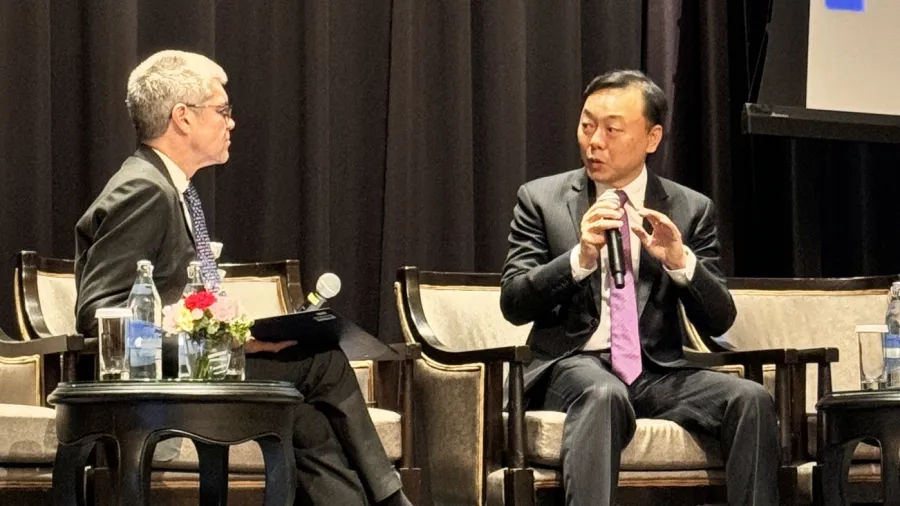
Siam Commercial Bank shares crisis lessons from pandemic
The bank’s early investment in tech helped it grow its digital customer base to 17 million.
When COVID-19 hit the shores of Thailand, local banks had to face a new kind of problem that cannot be solved by throwing money at it.
“Liquidity was not a problem at the time if everyone recalled; actually, deposits flowed into banks because I think relative to other investments, investors felt more confident with the stability of the Thai banking sector. The issue is in terms of the health of the economy and the health of our clients,” Dr. Yunyong Thaicharoen, SEVP and Chief Wealth Banking Officer of Siam Commercial Bank (SCB), told attendees of the 2024 edition of the Bangkok leg of the Asian Banking & Finance Forum.
Speaking in a fireside chat, Thaicharoen — who was chief of corporate banking for SCB at the height of the pandemic — recalled the suddenness of the impact. “Both [the fall of] demand and supply shocked the economy. All the face-to-face activity came to a halt,” he said.
Local authorities immediately enacted measures to ease the burden for the stricken citizens, such as stopping payment collections for pending loans of their clients.
Banks, meanwhile, had to face the impending disaster that the end to this temporary debt relief may bring.
“We knew that the temporary debt relief that the Bank of Thailand required us to do at the beginning– to stop payment for our client for three months– that would not be enough,” Thaicharoen admitted.
He simplified the plan to one sentence: “The idea is for the regulator to help the banks to help the clients. Because even with the strong position financially, any single bank cannot go alone to help the client because the problem is so enormous.”
Three-pronged strategy
In his fireside chat, Thaicharoen listed three strategies that banks should adopt not just during the pandemic, but in preparation of possible crises in the future: building immunity, investing in technology — both in terms of infrastructure and human capability– and leveraging partnerships.
During the pandemic, revenue and cost optimisation became vital for the bank. This meant that SCB had to be selective and cautious on who to loan out to. Quality was paramount — the returns may be lower, but so are the risks.
“We put more emphasis on fee-based income, whether it’s wealth or insurance. On the cost side, it's also very important we emphasise on being lean in our operation by being strict on cost control,” Thaicharoen said.
Technology became a boon for SCB during the pandemic. Strict pandemic controls meant that more people had to shift into accessing financial services remotely, via online or through mobile devices.
SCB’s decision to invest in digital transformation 5-7 years before the pandemic began meant that they were prepared to accommodate the shift.
This helped the bank grow its digital customer base to 17 million people.
Partnerships also became paramount. For example, SCB turned to their digital partners both to reach new customers and enhance their current offerings.
“On the wealth side, we partnered with FWD for insurance and also for private wealth management,” Thaicharoen said. “We want to leverage, both in terms of digital technology and the digital channel that we have developed over time, the fact that we have relationship managers that can serve our clients more optimally.”
Hospitality concerns
One sector that was of much concern to Thaicharoen and SCB during the pandemic was the hospitality industry. With lockdowns in place globally, the airline industry and the tourism industry came at a standstill.
SCB, being the biggest bank in Thailand, had a lot of outstanding loans to the industry– “up to a hundred billion baht,” according to Thaicharoen.
"We helped our hotel clients by giving them a payment holiday for two years. No principal, no interest. And we actually reduced the expected interest payments. So basically, we reduced the NPV of the interest payment,” he said.
Another measure they did to support the embattled hotels and resorts was offering loan advice.
“We also included what we call a sweeping mechanism. If [the hotel’s] cash flow turned out to be better than what we planned or what we forecasted, then we encouraged them to pay even more than the scheduled payment,” he said.
SCB also provided working capital during the pandemic years.
“Even though they didn’t have revenue because many of them have closed the hotels, their expenses are still there. They have to pay utility bills; they have to pay their staff. So we provided working capital,” Thaicharoen recalled.
He said that SCB was “very glad” that once the country opened up, their hotel operators were able to respond quickly to the opening up, and that the majority of them have now resumed payments according to their chosen plans.
Outside of supporting hotels and resorts in Thailand, SCB has made expansion moves in 2024. These include buying Home Credit Finance Vietnam and introducing green loans for net zero buildings.
Wealth management
As for Thailand’s wealth management prospects, Thaicharoen tempered his optimism with a realistic take. “There is a lot of potential,” he said, noting that “I would say that wealth management in Thailand still has a long way to grow.”
“As you know, we are entering an aging society. So, the need for professional wealth management service is still growing and it's growing fast,” he added.
Thaicharoen and SCB are eyeing the top spot of becoming the leader in wealth management in Thailand.
As for how they will achieve this, Thaicharoen touted technology — in particular, the potential of AI use cases, and the evolution of digital channels as a means to capture the mass market segment.
Not a matter of perfection
Asked about the most important lessons that banks could learn from past global economic crises to better prepare for future uncertainties, Thaicharoen had two pieces of advice to impart: First, stop trying to be perfect; second, speed matters especially during a crisis.
“I think it’s not fruitful to try to come up with an accurate prediction, but it’s important to come up with a set of alternative scenarios that could happen and then plan accordingly so everyone knows what to do if scenario A arises, what scenario B arises,” he noted.
He also highlighted the importance of data: not just traditional, quantitative data, but more so, on the qualitative side.
“We need to understand the health of suppliers, the health of their consumers. So, the role data is totally different from the year past,” he concluded.



















 Advertise
Advertise











